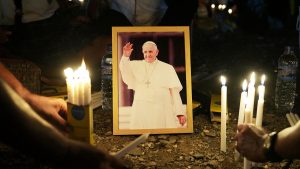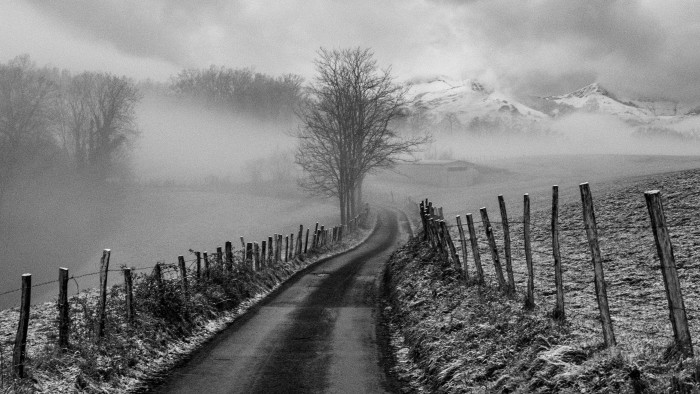Summarize this content to 2000 words in 6 paragraphs in Arabic Unlock the Editor’s Digest for freeRoula Khalaf, Editor of the FT, selects her favourite stories in this weekly newsletter.When Anne Rearick first arrived in the French Basque Country it was raining heavily. It was late autumn in 1990, and she’d just ridden the local train from Bayonne, on the coast, to the end of the line. She stepped out into the town of St-Jean-Pied-de-Port (the Basque name is Donibane Garazi) in the province of Lower Navarre, the central of France’s three Basque provinces.The rain didn’t let up and, feeling more than a little miserable, she sat down on a bench in a farmers market, soaked through. That was when Rearick was approached by an elderly widow named Madame Hatoig, who invited her back to her home with an offer of tea and madeleines, a towel and some slippers. It was the beginning of a friendship between the two women that would last up until Madame Hatoig’s death, as well as the start of a 34-year relationship between Rearick and this often neglected corner of Europe.Rearick had grown up over 8,000km away in Boise, Idaho, but she already had a sense of what it meant to be Basque. The area around Boise is home to the second-largest Basque community in the US. Within a largely homogeneous population in rural Idaho, the Basques felt like an “exotic” presence, Rearick told me. “I would hear my grandfather talk about their language,” she said. “About how different it is. They’d have these big festivals, or picnics, with lots of great music and dancing. So I had this childhood sense of the Basques being really different and mysterious.” Soon after finishing grad school Rearick was granted a Fulbright fellowship to travel to the Basque Country to spend a year photographing. Since that first trip, spent in the company of Madame Hatoig and her friends, Rearick has criss-crossed back and forth between her home in the US and her home-away-from-home in southern France. The photographs she has made over more than three decades show the deep bond she’s formed with the people, the land and the animals. The work has just been published as a book, Gure Bazterrak.The title comes from a Basque poem by Joxean Artze. It’s a hard phrase to translate, but if it were easy, you would simply say “our land”. Within that translation, there are layers. Ones of defiance and pride, of joy and pain. In her contributing essay for the book, Nora Arbelbide, a resident of St-Jean-Pied-de-Port who Rearick has seen grow from a 10-year-old girl to a 44-year-old woman, writes that “words can hold many meanings in Basque”. Bazterrak can mean not just land, but landscape, countryside or borders.More often than not, the nations contained within borders are a social construct. We all enter, willingly or not, into an understanding that this land is yours and this land is mine. Here we speak Spanish, and here we speak French. Even if neither of those languages is truly your own. Even so, in some places those constructs hold less firmly than in others. Ideas around nationality blur, merge, fade or disappear completely. One of the threads running through all of Rearick’s work is that of survival in the face of erasure. She has photographed communities in the Appalachian mountains, in Scotland, South Africa and Kazakhstan, often focusing on communities who are at risk of being wiped out altogether. Documenting rural life appeals to what Rearick described to me as a desire to exist in “slow-time”. A space where the rhythms and tenor of your days are dictated by the seasons rather than smartphone calendars. Birdsong over notification pings. The locals assume she is on holiday when she visits, which of course she’s not. She’s working, making pictures. But travelling between villages, spending time in friends’ homes, observing and documenting, is not the same as farming.Rearick told me she had a certain naivety when she first began photographing in the region. “I went in thinking I was going to photograph everything,” she said. But slowly her focus became narrower and she homed in on a few friends, families and villages. This concentration of focus leads to a profound directness of gaze. There is no condescension, or sentimentality. Although there is romance, there is no romanticism. The lives Rearick depicts are beautiful, but they are hard. She seems to stand beside her subjects rather than above or in front of them as though there is a shared purpose to her image-making. A desire to give, as well as to take. “If you have the chance to meet Anne Rearick one day in your life, you will see her at least twice,” writes Nora Arbelbide in the book. “Because the first time she will take a picture of you, the second time she will bring the picture back to you. And it will be an excuse to spend time together again. Rearick gives back what she receives.”It’s a cliché to talk of photographs such as these as being timeless, but the word is hard to avoid in this case. The Basque language goes back millennia, predating the Indo-European languages that surround it. The people themselves feel like they could belong to any decade going back centuries.Rearick’s portraits feel egalitarian – an impression emphasised by her square frame and the subtle black and white tones. Everything is balanced; everything is even. The photographs are presented in the book without dates or captions. We don’t know if a certain image was made on her first trip or her last. Young or old, human or animal, every being is treated with the same amount of consideration and respect in front of Rearick’s lens. Birds and lambs are cradled as gently as newborn babies and are captured on film just as tenderly. It is through that approach that we share in Rearick’s love and admiration for the whole. Anne Rearick is a member of Agence Vu and represented by Galerie Clémentine de la Féronnière, Paris. “Gure Bazterrak” is published by Deadbeat Club, deadbeatclubpress.com Find out about our latest stories first — follow FT Weekend Magazine on X and FT Weekend on Instagram
rewrite this title in Arabic A way of life as old as the hills — Anne Rearick’s Basque Country
مقالات ذات صلة
مال واعمال
مواضيع رائجة
النشرة البريدية
اشترك للحصول على اخر الأخبار لحظة بلحظة الى بريدك الإلكتروني.
© 2025 جلوب تايم لاين. جميع الحقوق محفوظة.




